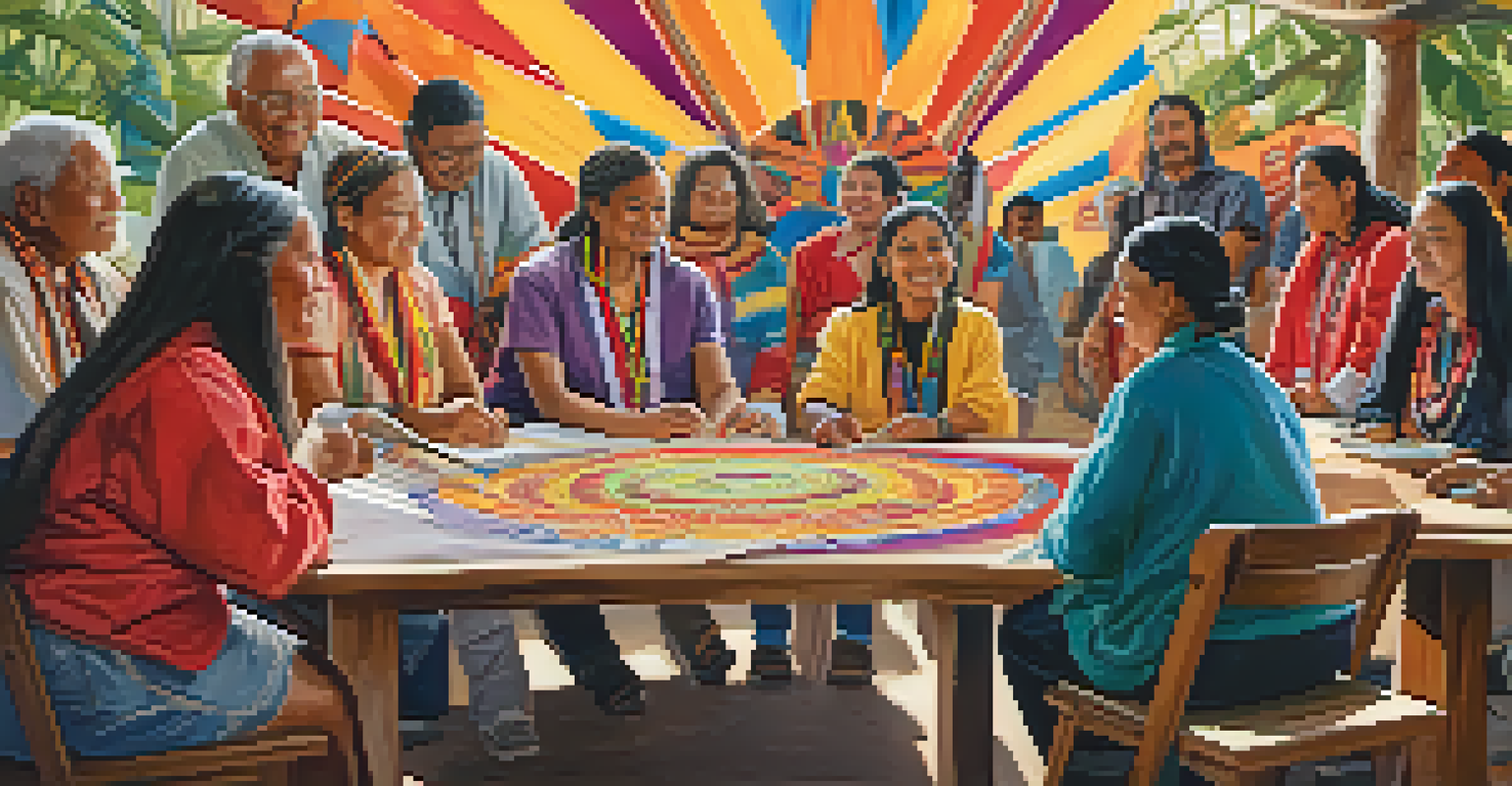Entheogens and Indigenous Rights: Ethical Considerations

Understanding Entheogens and Their Cultural Significance
Entheogens are substances, typically derived from plants, that are used in a spiritual context. Historically, many indigenous cultures have incorporated these substances into their rituals for healing, divination, and connecting with the divine. For these communities, entheogens are not merely recreational drugs; they hold deep cultural and spiritual significance, often passed down through generations.
The use of entheogens is a sacred act, and it carries the weight of cultural heritage and identity.
However, as interest in these substances grows in mainstream society, the original contexts and meanings can become overshadowed. This raises important questions about cultural appropriation and respect for the traditions of indigenous peoples. It's crucial to understand that using these substances outside of their traditional settings can lead to a dilution of their cultural value.
By recognizing the importance of these practices to indigenous identities, we can better appreciate the ethical landscape surrounding entheogens. The challenge is to honor and respect these cultural traditions while navigating the expanding interest in their use in contemporary society.
The Intersection of Entheogens and Indigenous Rights
The use of entheogens by indigenous peoples is often intertwined with their rights to self-determination and land. These communities have long fought for recognition and respect for their spiritual practices, which are often threatened by external pressures. For instance, the commodification of entheogens can undermine these practices, reducing sacred rituals to mere trends.

Legal frameworks surrounding entheogen use often fail to consider the rights and perspectives of indigenous peoples. When non-indigenous individuals and corporations exploit these substances for profit, it can lead to the further marginalization of the very cultures that have nurtured them for centuries. It's important to advocate for policies that protect indigenous rights in this context.
Respect for Indigenous Traditions
Entheogens hold deep cultural significance for indigenous peoples, and using them outside their traditional contexts can lead to cultural appropriation and dilution of their value.
Supporting indigenous rights means honoring their knowledge systems and ensuring they have a voice in discussions about entheogens. This requires collaboration and respect, allowing indigenous communities to lead conversations about their cultural heritage and the use of entheogens in a way that reflects their values.
Cultural Appropriation vs. Cultural Appreciation
Navigating the line between cultural appropriation and appreciation is essential when discussing entheogens. Cultural appropriation occurs when elements of one culture are adopted by another, often without understanding or respect for their significance. In contrast, cultural appreciation involves a deep respect and understanding of the traditions and practices of another culture.
Cultural appropriation is taking things from a culture without understanding or respecting their significance.
For example, when individuals use entheogens without acknowledging their origins or the indigenous peoples who have used them for millennia, it can feel exploitative. This can lead to resentment among indigenous communities who see their sacred practices being commercialized or misrepresented. Understanding this distinction is vital for fostering respectful relationships.
Engaging with indigenous cultures in a manner that encourages learning and mutual respect can help bridge the gap. This might include attending workshops led by indigenous leaders or supporting indigenous-led initiatives that focus on education and preservation of their traditions.
Legal Implications of Entheogen Use
The legal status of entheogens varies widely across different regions, creating a complex landscape for users and indigenous communities alike. In many places, these substances remain illegal, which complicates the ability of indigenous peoples to practice their traditions freely. This legal ambiguity often leads to conflicts over the ownership and use of traditional knowledge surrounding these substances.
Some countries have begun to recognize the rights of indigenous peoples to use entheogens as part of their spiritual practices. However, these legal protections are inconsistent and often contingent on broader societal attitudes toward drug use. This inconsistency can lead to a lack of trust between legal authorities and indigenous communities.
Ethical Engagement is Crucial
Consumers have a responsibility to engage ethically with entheogens by supporting sustainable practices and understanding their cultural significance.
To create a more equitable legal framework, it's essential to include indigenous voices in policy-making processes. By doing so, we can ensure that laws reflect the values and needs of those who have historically used these substances for spiritual and cultural purposes.
Ethical Consumption of Entheogens
As interest in entheogens grows, so does the responsibility of consumers to engage ethically with these substances. Ethical consumption involves understanding the source of the entheogens, the impact of their harvesting, and the wider implications for indigenous communities. Consumers should strive to support ethical suppliers who prioritize sustainability and fair practices.
Additionally, educating oneself about the cultural significance of these substances can lead to more respectful usage. This includes understanding the rituals and traditions associated with entheogens, as well as being aware of the potential harms of misuse. By approaching entheogens with respect and awareness, consumers can foster a more ethical relationship with these powerful substances.
Ultimately, ethical consumption is about creating a balance between personal exploration and respect for indigenous cultures. This balance can help ensure that the resurgence of interest in entheogens does not come at the expense of those who have historically guarded their sacred traditions.
Collaborative Efforts for Indigenous Empowerment
Collaboration between indigenous communities and non-indigenous allies is essential for addressing the ethical considerations surrounding entheogens. By fostering partnerships that prioritize indigenous voices and leadership, we can work towards a more equitable approach. This collaboration can take many forms, from supporting indigenous-led initiatives to participating in community education efforts.
For instance, some organizations are dedicated to preserving indigenous knowledge about entheogens while advocating for the rights of these communities. These partnerships can help raise awareness of the cultural significance of entheogens, ensuring they are not reduced to mere commodities. Together, we can promote understanding and respect for indigenous practices.
Collaboration for Empowerment
Building partnerships between indigenous communities and non-indigenous allies is essential for empowering indigenous voices and preserving their cultural heritage.
Ultimately, the goal is to empower indigenous communities to reclaim their narratives around entheogens, allowing them to share their stories on their own terms. By doing so, we not only honor their traditions but also contribute to their resilience and cultural survival.
Future Directions: Ethical Engagement with Entheogens
As the conversation around entheogens continues to evolve, it’s crucial to consider future directions for ethical engagement. This involves not only respecting indigenous rights but also recognizing the potential benefits of entheogens for personal and collective healing. By prioritizing ethical practices, we can help ensure that the resurgence of interest in entheogens is grounded in respect and understanding.
Education plays a significant role in this process. By learning about the cultural contexts of entheogens, individuals can approach these substances with the respect they deserve. This includes advocating for policies that protect indigenous rights and promote the responsible use of entheogens, ensuring that their cultural significance is preserved.

In conclusion, engaging ethically with entheogens requires a commitment to understanding and respecting indigenous cultures. By fostering dialogue, supporting indigenous leadership, and practicing responsible consumption, we can create a more equitable future for all involved.